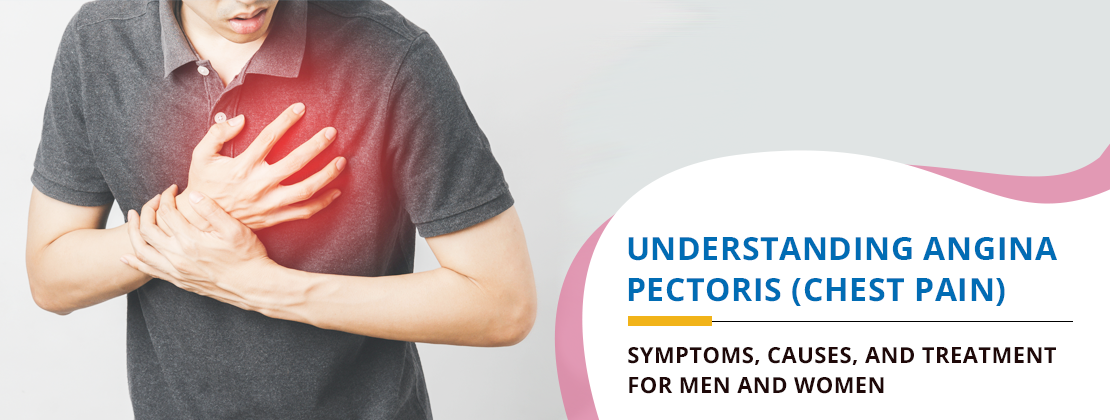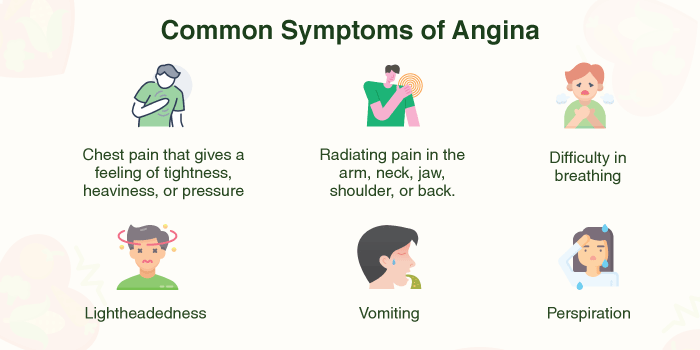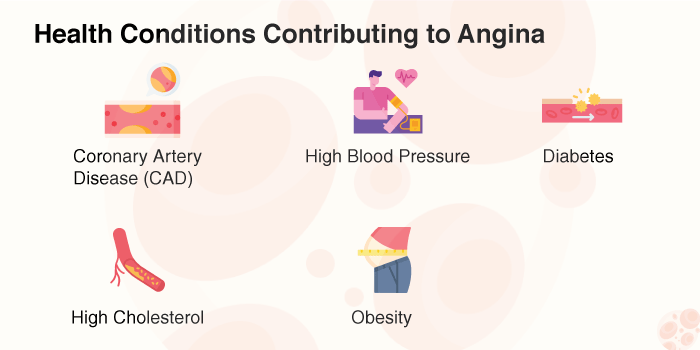
Home / Blog / Understanding Angina Pectoris (Chest Pain): Symptoms, Causes, and Treatment for Men and Women
Angina pectoris, also known as angina chest pain, is a sign of a heart problem that causes discomfort or pain in the chest. This serious condition results from inadequate blood supply to the cardiac muscles and usually indicates underlying cardiovascular issues. It is important to be able to identify and interpret the signs of angina, especially the gender-specific differences in how they manifest in men and women, to take appropriate action and administer treatment without any delays.
The blog explores angina pectoris symptoms, including how they differ between men and women. It will also mention some of the treatment options for angina. Understanding these distinctions can lead to more accurate diagnoses and better management of this potentially life-threatening condition.
Table of Contents
When the heart lacks enough oxygenated blood, it causes chest pain referred to as angina pectoris. This disease is often seen as a sign of coronary artery disease (CAD), which is characterised by blockage or constriction of the coronary arteries.
There can be various reasons that one experiences angina, and they include:
Along with chest pain, patients with angina may experience other symptoms too, and they include:
Also Read: Is Heart Bypass Surgery Safe?
Depending on its occurrence, angina is classified into the following types:
Also Read: How to Handle Medical Emergencies

Chest pain may not be the only symptom of angina, and patients experience other symptoms. Below is the list of the commonly experienced symptoms of angina:

Classic symptoms of angina pain in men include:

Women frequently suffer from less pronounced or irregular angina signs like:
Many times, people confuse these signs with different illnesses in women, which results in the condition being underestimated or treatment postponed.
An angina attack occurs when the heart’s oxygen demand exceeds its supply. It often causes chest pain or a feeling of pressure for a short period. Rest or medications can improve stable angina, but worsening or prolonged pain may be a sign of a heart attack. Call for immediate medical help if:
Also Read: How to Avoid Heart Attack in Younger Age
Various factors contribute to the increased chances of one having angina pectoris, and they include:

The significant role played by hormonal differences is evident, especially in the way estrogen protects women who have not reached menopause. A woman’s risk increases after menopause due to changes in her hormonal balance.
Women may experience symptoms that imitate non-cardiac diseases, leading to underdiagnosis or misdiagnosis. This shows that it is important for both healthcare providers and patients to be extra careful.
Also Read: How to Beat Heart Attack Risks
Physical Exam and Health History: Assessing risk factors such as family history, lifestyle, and pre-existing conditions.
The following tests are recommended for the detection and diagnosis of angina:
Early detection of angina may avert fatal complications such as heart attacks and enhance treatment success.
There are multiple treatment approaches available for angina management:
Men and women may have different treatment plans, with particular reference to medication dosages and lifestyle recommendations tailored to hormonal influences.
Also Read: How to Prevent Heart Disease: Tips for a Stronger, Healthier Heart
There are several angina pectoris prevention measures; adopting them can reduce one’s angina risk and improve the overall quality of life.
Regular observation may detect the initial symptoms of heart disease and minimize the chances of angina.
Angina pectoris acts as a warning sign for potential heart problems. Understanding the symptoms, causes, and treatment of angina can help people stay ahead with their heart health. Early recognition and gender-specific considerations play a crucial role in effective diagnosis and treatment.
In case of chest pain or discomfort, which are symptoms of angina, one should see the top cardiologists at HCG Hospitals, which has super-specialty hospitals in Ahmedabad, Bhavnagar, Rajkot, and Hubli. HCG Hospitals is among the leading healthcare facilities in the country that provide advanced cardiology to promote your well-being.
For more information on cardiac care services and to book appointments with some of the best cardiologists in India at HCG, please visit HCG Hospitals — the Best Heart Hospital in India for Comprehensive Cardiac Care.